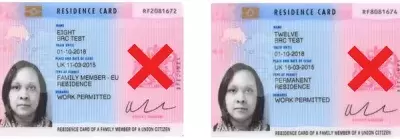Travel to the EU
This information applies to the following people, resident in the UK, and looking to travel to an EU country:
- EU/EEA/Swiss citizens - for simplicity, referred to as EU citizens on the remainder of this page
- British family members of EU citizens
- Non-EU family members of EU citizens
Note – this information is a simplified summary, it is not legal advice and could be subject to change.
EU citizens
You have freedom of movement throughout the EU.
You can travel using your EU passport or national ID card, and there is no restriction on your length of stay in any EU country if you exercise treaty rights in that country.
The UK stopped accepting nationality identity cards for entry to the UK for EU citizens after 1st October 2021, with some exceptions. These exceptions include having settled or pre-settled status, in which case you can continue to use your national ID card to enter the UK until at least 31 December 2025 (and beyond that date if it is a biometric national ID card).
British family members of EU citizens
British citizens will be treated as ‘VISA EXEMPT’, subject to reciprocity by the UK in relation with the EU27. This means you only require your British passport.
If you are travelling without your EU family member, then travelling with your passport will give you the right to stay in the Schengen zone for no more than 90 days in any 180-day period. There are a few tools available to help you calculate the 90-day rule:
- Schengen Visa Calculator provided by SchengenVisaInfo
- European Commission's short-stay visa calculator, with a user manual
- Schengen short-stay visa calculator provided by VisaGuide.World
- or look for Schengen calculator apps on your mobile phone.
Should you wish to stay in the EU for periods longer than a visit, you will need to look at what options are available depending on the country you are travelling to within the EU and your circumstances.
If you are accompanying or joining an EU family member in order to live in an EU member state, then this gives you an EU residence right which is not limited to 90 days in any 180-day period (subject to your family member exercising treaty rights in that EU member state). See also this FAQ about travelling to the EU for more than 90 days when not intending to reside in an EU member state.
Non-British, non EU family members of EU citizens
First of all, you need to know whether you are from a country whose nationals would ordinarily require a visa to cross the external border of the EU:
For travel to Ireland, check here to see whether you are a ‘visa-required’ or ‘visa-exempt’ national.
For travel to EU member states other than Ireland, see Annex I in this doc for ‘visa-required’ nationals, and Annex II in this doc for ‘visa-exempt’ nationals. The European Commission has more information, including an interactive map showing all visa requirements for all countries.
Travelling without your EU family member
If you are travelling without your EU family member, then travelling with your passport (‘visa-exempt’ national), or with your passport and visa (‘visa-required’ national) will give you the right to stay in the Schengen zone for no more than 90 days in any 180-day period. The European Commission provides a calculator for the 90-day rule.
Should you wish to stay in the EU for periods longer than a visit, you will need to look at what options are available depending on the country you are travelling to within the EU and your circumstances.
See this FAQ for more information on why some non-EU family members will now need a visa to travel to the EU, despite having a biometric residence card from the UK.
Accompanying or joining your EU family member
If you are you are accompanying or joining an EU family member in order to live in an EU member state:
If you a ‘visa-exempt’ national, then accompanying your family member gives you an EU residence right which is not limited to 90 days in any 180-day period (subject to your family member exercising treaty rights in that EU member state). You will again need your passport to travel.
However, if you are a ‘visa-required’ national, the UK’s ‘Residence card of a family member of a Union citizen’ will no longer be valid for travel to the EU after the end of the transition period. This is because it is a UK issued card, which is no longer recognised by the EU.
If you are travelling to an EU member state of which your EU family member is not a national, you will be entitled to apply for and be issued with a family permit visa free of charge, and as soon as possible on the basis of an accelerated procedure. For details of this procedure, check with the embassy / relevant website of the country you wish to travel to.
If you are travelling to the EU member state of which your EU family is a national, check with the embassy / relevant website of that member state for details.
This then gives you an EU residence right (subject to your EU family member exercising treaty rights) which is not limited to 90 days in any 180-day period.
Note the different kinds of cards which all look very similar
Residence card, issued under Immigration (EEA) Regulations 2016
Mentions the words ‘Residence card of a family member of a Union citizen’.
NOTE: This card is no longer valid for travel to the EU.

EU Settlement Scheme Residence card (issued to non-EU citizens only)
This is only relevant in the UK, and is not valid for travel to the EU, not even when it contains the wording 'Issued under the EU Exit Separation Agreements'

Residence permit
Issued under UK Immigration rules – this is only relevant in the UK, and is not valid for travel to the EU



